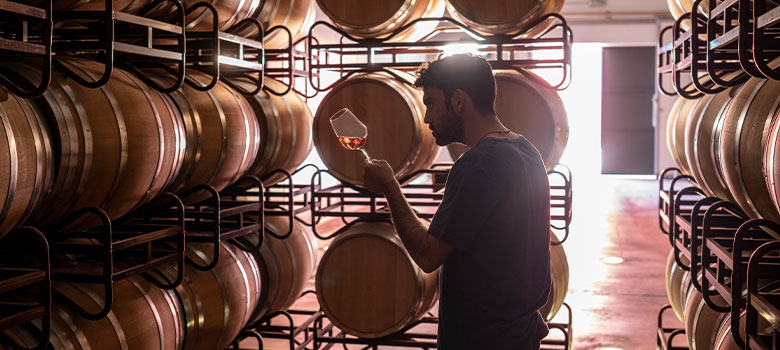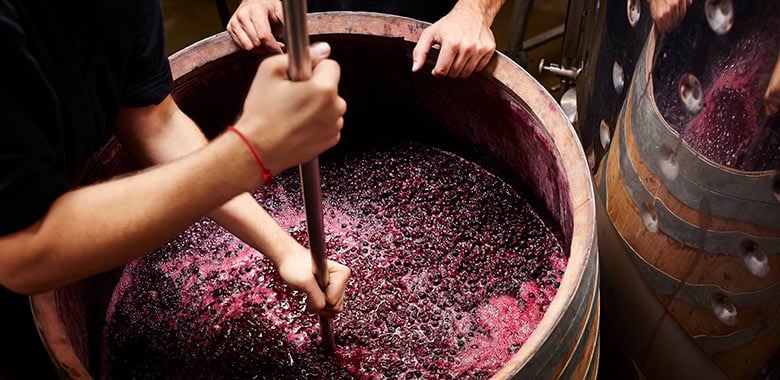
Wine
What is Vegan Wine?
Despite being made from grapes and yeast, not all wines are considered vegan. This raises the question of what other ingredients or processes may be involved in its production. Why aren’t all wines vegan? And what is ‘vegan wine’ made of?
Let’s take a deep dive into the world of vegan wines and answer all of your questions. In recent years, the popularity of veganism has surged, and so has the demand for vegan wine, not only in Australia but worldwide. We’ll uncover the secrets behind the production of vegan wine, and shed light on why not all wines can proudly wear the vegan label.
Shop Vegan Wine
WHAT IS THE DIFFERENCE BETWEEN VEGAN WINE AND NORMAL WINE?
If this is new to you, you may be wondering why is regular wine not vegan? The difference between wines labelled as vegan and ‘normal’ wines comes down to protein. Do you know wine sometimes contains traces of animal products?
The concern is not about bugs or other creatures accidentally getting crushed, but rather about the winemaking process itself. For those who follow a vegan or vegetarian lifestyle, this could be problematic. However, winemakers have the ability to adjust their methods to accommodate all types of consumers. So what is vegan wine made of?
When it’s very young, a wine usually appears hazy and includes floaters and sediment, just like cloudy apple juice. And, while some of us love our apple juice like this, most of us prefer our wines to be bright and clear.
These characteristics will correct, and the wine will clarify naturally over time, but to speed things up, winemakers usually put them through a manual process known as fining. When a fining agent is added to a wine, it either binds to the suspended solids and causes them to fall to the bottom where they can be filtered, or it absorbs them
WHAT IS USED TO FINE WINE?

Fining agents come in many guises and some of them are derived from animal products with the most common ones including blood and bone marrow, isinglass (gelatine from fish bladder membranes), egg albumin, fish oil, gelatine (animal protein) and casein (milk protein). That is why you often see disclaimers on wine labels such as, “May contain traces of egg white or fish products.”
These agents can be used to remove tiny particles of sediment, that filtering alone can’t. While these fining agents are precipitated out of the wines, the minuscule traces that may be absorbed into the wine are problematic for vegetarians and for vegans, whose diet and lifestyle eliminates anything containing animal products or by-products.
WHAT IS USED TO FINE VEGAN WINE?

Thankfully, vegans and vegetarians can still enjoy a good drop without worrying about the use of animal-derived ingredients in the process.
There is vegan red wine, vegan white wine, and vegan sparkling wine available for consumers, which winemakers have used non-animal derived fining agents. These include different types of clay-based agents such as bentonite, limestone, silica gel, activated charcoal, and plant casein.
When they can, more and more winemakers are also choosing not to fine or filter their wine, allowing them to self-stabilize with particles naturally sinking to the bottom.
DO VEGAN WINES TASTE DIFFERENT TO OTHER WINES?

There is no real difference in taste or character between wines fined with animal products or earth-based fining agents. Some wineries use the ‘traditional’ agents, others use earth and plant-based only, some use either method depending on the variety and style, and if time allows, some don’t fine or filter. As always, the flavour and characteristics of a wine comes down to the terroir, the vintage, the quality of the fruit, and the style it is made in.
ARE ORGANIC WINES VEGAN?
Organic wines and vegan wines share a common goal of embracing sustainable practices and minimising environmental impact. However, it's important to note that while all vegan wines can be organic, not all organic wines are necessarily vegan.
The key distinction lies in the winemaking process. Organic wines are produced from grapes that have been cultivated without the use of synthetic pesticides, herbicides, or fertilizers. These wines prioritise the use of natural and organic methods to ensure the health of the vineyard ecosystem.
On the other hand, vegan wines go beyond organic practices by also avoiding the use of animal-derived fining agents during the clarification process. Therefore, while organic wines are a step towards sustainability, it's essential to specifically seek out wines labelled as both organic and vegan to ensure they align with your ethical choices and dietary preferences.
HOW DO I KNOW IF A WINE IS VEGAN?
In Australia, wine-producers are required by law to state on their labels if milk or egg products have been used during production. Usually, wines that have not been fined or filtered will also state this on the label, but if you are a vegan, the best option is to choose a wine that has been certified as vegan.
WHAT WINERIES PRODUCE VEGAN WINES?
Many Australian wineries produce vegan wines, amongst them De Bortoli Wines, d’Arenberg, Bleasdale, Gemtree, and Yalumba. While a few produce vegan-only wines, others produce vegan and non-vegan wines, so it’s always wise to check the label and details of each individual wine.
At Wine Selectors, we have a great range of premium vegan wines to choose from, so you’ll always be able to enjoy your favourites, or better still, discover some new ones.
Check out our quality range of red and white vegan wines today.